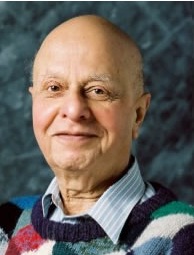Aravind Joshi, Engineering
 Aravind Krishna Joshi, the Henry Salvatori Professor Emeritus of Computer and Cognitive Science at the University of Pennsylvania, died on December 31. He was 88.
Aravind Krishna Joshi, the Henry Salvatori Professor Emeritus of Computer and Cognitive Science at the University of Pennsylvania, died on December 31. He was 88.
Dr. Joshi earned a bachelor of engineering degree from Pune University in India in 1950, a master’s degree from Penn in 1958 and a PhD from Penn in 1960. As a graduate student, Dr. Joshi was on the team led by Zellig S. Harris and Henry Hiz that created the first natural language parser in 1959.
Dr. Joshi was appointed assistant professor of electrical engineering in 1961 and received a secondary appointment in the department of linguistics in 1964. He became associate professor of electrical engineering in 1967 and then professor of electrical engineering in 1972. He became emeritus in 2012.
His research focused on the intersection of computer science and linguistics. In his early work, Dr. Joshi developed much of the mathematics of linguistic called “tree-adjoining grammars,” which have aided the analysis of human languages and led to developments in artificial intelligence and biological computation. He later worked with Lila P. Gleitman of the psychology department on interdisciplinary research projects branching psychology, linguistics and computer science, and contributed to the growth of a new academic discipline called cognitive science. In 1983, Dr. Joshi became Henry Salvatori Professor of Computer and Cognitive Sciences. In 1990, along with Dr. Gleitman, he started Penn’s Institute for Cooperative Research in Cognitive Science.
In 2001, the Aravind K. Joshi Endowed Term Assistant Professorship in Computer and Information Science was created with a gift from Silicon Valley entrepreneur and Penn alumnus Jerry Kaplan (Almanac January 16, 2001).
Dr. Joshi was the recipient of many honors and awards, including the Benjamin Franklin Medal in Computer and Cognitive Science from the Franklin Institute (Almanac April 5, 2005); the Cognitive Science Society’s David Rumelhart Prize for Contributions to the Theoretical Foundations of Human Cognition, 2003; the Association for Computational Linguistics (ACL) Lifetime Achievement Award, 2002; and the International Joint Conference on Artificial Intelligence (IJCAI) Award for Research Excellence in 1997 (Almanac April 1, 1997). He also served as ACL president in 1975.
He is survived by his wife, Susan (Heyner); daughters, Shyamala and Meera; and grandchildren, Marco and Ava.
Contributions in his memory should be directed to The Aravind K. Joshi Professorship Fund. Checks can be mailed to Penn Engineering, Office of Development and Almuni Relations, 123 Towne Building, 220 South 33rd Street, Philadelphia, PA 19104-6391.
